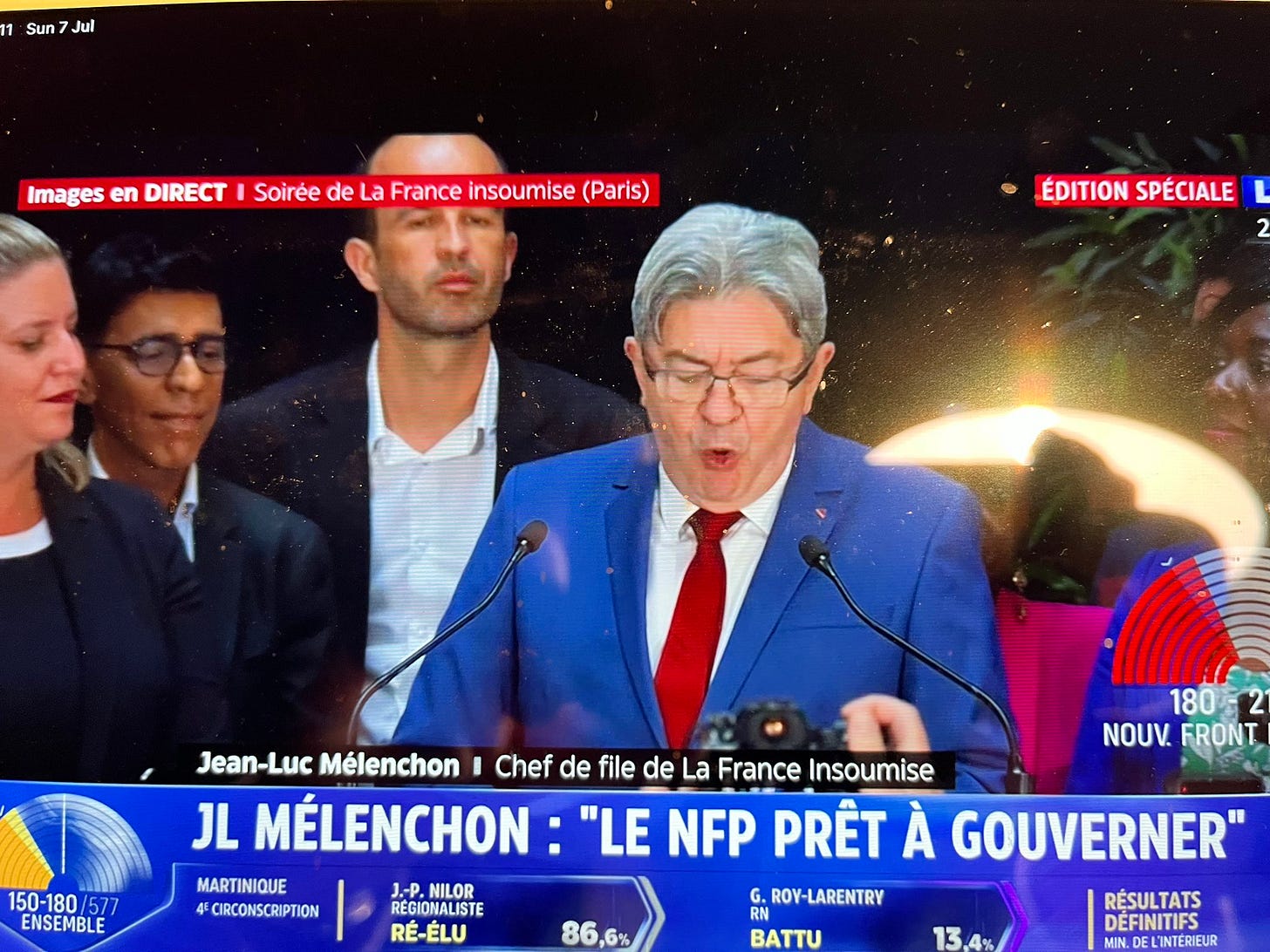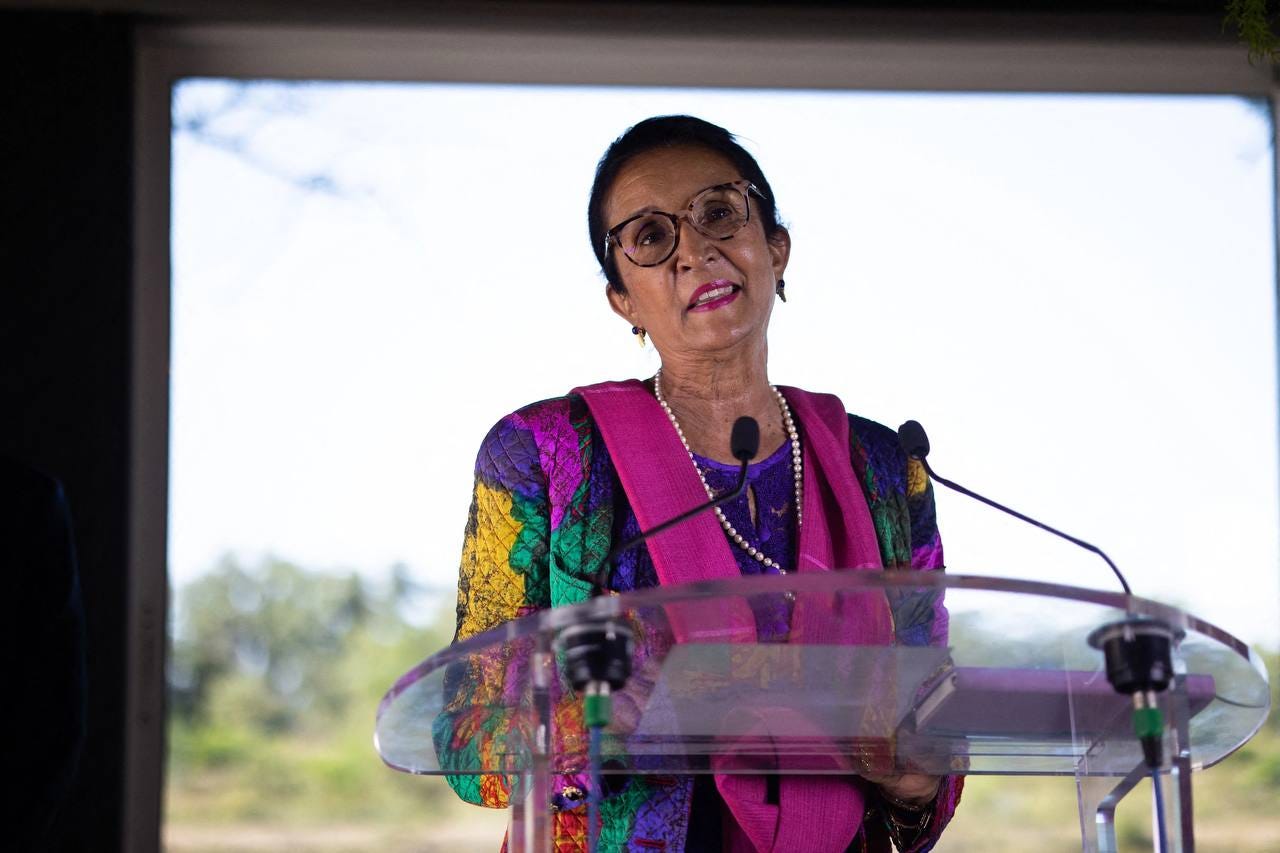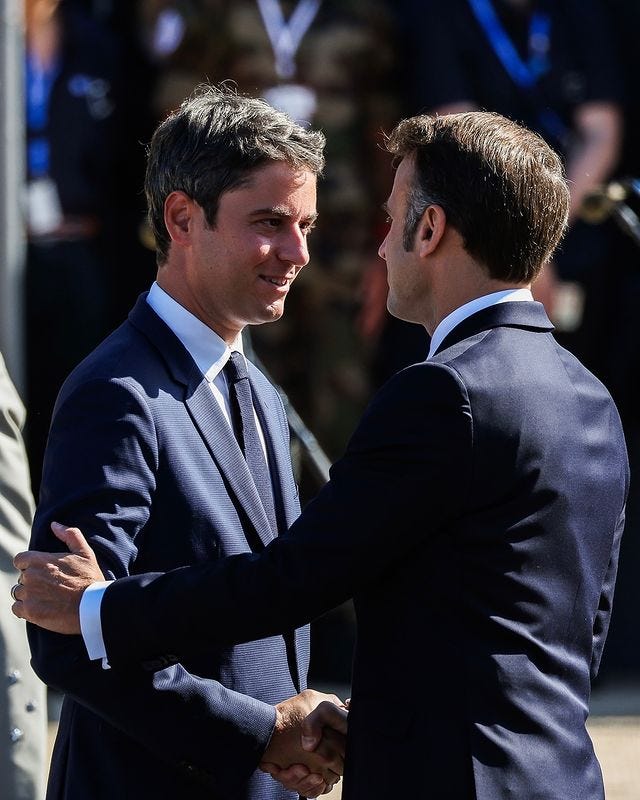French Post-Election Follies🎉: Into The Great Wide Open
In France's political culture, "compromise" is a four-letter word.
Let’s start with the good news, and then go downhill from there.
On July 7 the French got their act together and prevented the far-right Rassemblement National party from getting the most seats in the French National Assembly. To seize control, a party needs 289 seats for a majority in the 577-seat assembly.
Despite polls showing Marine Le Pen’s RN likely to be the big winners of the second round of voting, the party came in third (cue sad trombone music) with just 142 seats. And so, RN poster boy Jordan Bardella — in line to potentially be prime minister — was left to lick his wounds and doom scroll through Tiktok. He declared that his party had faced an “unnatural” political alliance of “dishonor” designed to thwart the will of the French people.
 Tiktok failed to load.
Tiktok failed to load.Enable 3rd party cookies or use another browser
Ensemble, French President Emmanuel Macron’s centrist party, finished a surprising second, with 161 seats.
However, the big shock came from the left-wing alliance, the New Popular Front, cobbled together in haste after Macron decided to dissolve the Assembly and call a snap election. The Nouveau Front Populaire (NFP) won 188 seats.
The outcome meant that the majority of the French people could rejoice that the so-called Front Républicain had held. To block the RN, parties in the center and left agreed that in races where 3 candidates qualified for the second round, any of their people who finished 3rd would drop out to avoid splitting the anti-RN vote.
This celebration lasted approximately 5 minutes.
A Republic, If You Can Keep It
The French road to a stable democracy has been a bumpy one. There was the whole French Revolution business where the king lost his head and there was a Republic for a nanosecond that was marked by mass killings and civil war and eventually an Emperor.
If you blinked, you might have missed the Second Republic which lasted about 3 years falling somewhere between the restoration of the Monarchy and the rise of a new Emperor in 1851. Following a humiliating loss in a war against Prussia, the 3rd Republic was born in 1870 and had a decent run until those Prussians — re-branded as Germans — came rolling through in 1940.
Post-Nazi invasion, the 4th Republic began and lasted until 1958. The 4th was a strong parliamentary-led system that proved dysfunctional. So the French wiped the slate clean and started over with the 5th Republic which featured a strong presidential system. Gen. Chuck De Gaulle became the first prez.
Normally in the 5th, the president wins and his party gets a majority in the legislature. A couple of times, a different party has won the majority and got to choose a prime minister, who is kind of like the Chief Operating Officer of the government (picks the ministers, etc.). Such moments are called co-habitation, a perfectly awkward label.
What has never happened is what has just happened: The president’s party did not get a majority and no one got a majority.
The fun part of this is that literally no one knows what is supposed to happen next. After all, the 5th Republic is only 50+ years old and Macron is just the 8th president. Basically, he’s the Martin Van Buren of the 5th Republic.
The French constitution doesn’t directly address the situation. There is no deadline for the president to select a new prime minister and no obligation to accept a PM put forward by the party with the most seats. The current deadline (to the extent that one exists) is July 18, when the new National Assembly meets and chooses a president of the Assembly.
However, there is no official guideline for which party even has the right to try and form a government. The only unofficial rule is that anyone named PM has to be someone who wouldn’t risk a majority No Confidence vote in the Assembly, which would effectively dissolve the government and then the whole thing starts again.
So, what to do? What to do?
And The Winner Is…
If you are not French, then your natural reaction might be as follows: Different parties try to form a coalition that has a majority of seats. That coalition then selects a prime minister and life goes on.
Ah, but for that to happen would require one of the most taboo words in the entire French political language: compromise.
Compromise just ain’t a thang here.
Let’s look more closely at the voting numbers to understand why French politics currently resembles a barrel of monkeys. Starting with the RN, it’s true that the party fell well short of expectations in terms of the number of seats it won. But the RN won the most raw votes in the legislative election, with 33.21% in the first round and 37.06% in the second round. That didn’t translate into an equivalent number of seats due to the breakdown of districts.
The NFP won 28.21% and 25.80%, in the first and second rounds respectively, while Macron’s party won 21.28% and 24.53%. What complicates this picture between the NFP and Macron is that Republican Front: With each group having candidates drop out to block the RN, to what extent can either claim those people voted for their group?
But wait, it gets even better!
The NFP is principally an alliance of four parties: the far-left La France Insoumise (LFI), the center-left Socialist Party (PS), the Greens, and the Communist Party. In the allocation of the 188 NFP seats, LFI got 78, PS got 65, the Greens got 33, and the Communists got 9.
Because the NFP was patched together in haste, the common platform was fairly general (though certainly progressive) and the group avoided discussion before the election about who it might put forward as a prime minister.
Just moments after initial exit polls showed the left coalition would come out on top but without a majority, LFI leader and political firebrand Jean-Luc Mélenchon took to the podium to state unequivocally that there was ZERO chance the NFP would form an alliance with Macron’s party and that Macron needed to suck it up and ask the NFP to form a government, tout de suite.
Mélenchon has done an admirable job of resurrecting the French left in recent years. But his authoritarian demeanor rubs even many allies on the left the wrong way. Still, Mélenchon hates Macron for a living, and so he was clearly relishing the moment.
“The President of the Republic must appoint a Prime Minister from the New Popular Front,” Mélenchon said. “And then, it will be the responsibility of our adversaries not to make France ungovernable…For 7 years, we have tirelessly fought Mr. Macron's policies. We refuse any combination with the presidential camp. We will have a Prime Minister from the New Popular Front. We will be able to decide many things by decree.”
Notably, he did not appear post-election with reps from the other parties in the NFP coalition, who all held their own rallies. Eight days later, the NFP allies have not been able to agree on a prime minister candidate.
For a few hours last weekend, the LFI and Communists proposed Huguette Bello, a member of the LFI and president of La Réunion, the French island territory off the coast of Africa. But members of the Socialist Party met the suggestion with a big NOPE and Bello issued a statement withdrawing her name due to the lack of consensus.
The challenge now is that many centrists view the LFI as dangerous extremists in the same way they see the RN as dangerous extremists, and therefore refuse to support any nominee or coalition that is attached to the LFI. (Side note: the LFI’s politics may be further left, but it’s a false equivalency to paint them with the same anti-democratic brush as the RN. But that’s another newsletter.)
As former French president François Hollande, a stalwart member of the Socialist Party who was just elected to the Assembly, said in an interview: "It's impossible for an LFI personality to be appointed by the President. Even if he did, it wouldn't last three days."
However, the Socialists are still trying to make their candidate, Olivier Faure, a thing. But much like ‘fetch,’ the rest of the coalition is not having it. The intramural NFP squabbling continues with everyone blaming everyone else for refusing to, well, you know…compromise.
So, what to do? What to do?
Come Together, Right Now, Over Me
President Macron responded to the confusion with an open letter to the French in which he declared, “No one won. No single political force obtained an absolute majority, and the blocs or coalitions that have emerged from these elections are all in the minority.”
He said the results are a “demand for change and power-sharing, requires these forces to build a broad-based coalition…I am asking all the political forces who believe in republican institutions, the rule of law, parliamentarianism, and an inclination towards Europe and the defense of French independence, to engage in sincere and faithful dialogue to build a solid majority, albeit of necessity a mixed one, for the country.”
Sounds unifying, but “believe in republican institutions” is code from the center that such a coalition would not include the left-wing loonies of the LFI or the fascists of RN.
But, Macron’s center has its own problems.
Macron’s Prime Minister Gabriel Attal, who was just appointed a few months ago just after becoming old enough to drink, was caught by surprise when the snap election was called. He’s clearly unhappy with Macron. As is traditional, Attal presented his resignation after the second round of voting, though Macron asked him to hang around until a new PM is appointed.
The two frenemies got some good hang time yesterday while reviewing the military troops and then watching the traditional July 14th parade from the presidential rostrum.
They might be at loggerheads, but the fight for the post-Macron world has already begun. Attal was elected president of Macron’s centrist Renaissance group in the Assembly. What began as En Marche in 2017 and then became Renaissance is now being re-branded as Ensemble pour la République. So, everyone will need to buy new T-shirts and update their stationery.
Macron has reportedly warned his people not to get all itchy about their political futures: "If you start the 2027 campaign now, you'll be swept away.”
The press is having a field day, of course. "La Macronie sinks into a battle of the chiefs," said a headline in Le Figaro, while the newspaper Libération declared:
”It's all-out war" between Attal and Interior Secretary Gérald Darmanin as they stage a Succession-like fight to take control of Macron’s legacy and whatever husk remains of his once-promising centrist party.
The centrists are still keeping their centrist dreams alive. They are hoping that they can convince sympatico members of the center-left Socialists to break away to join the centrist party (whatever the name du jour is) and the center-right Les Republicans in a centrist coalition.
Of course, the irony of that is that this is effectively what Macron did with En Marche in 2017. He fashioned his new party as “neither left, neither right.” He promised to reform the economy, improve the social safety net, and fight climate change. In the process, he sliced off the moderate wins of the Socialists and Republicans and fashioned a new party that won a historic margin in the National Assembly.
That centrist party nearly smashed the Socialists and Republicans out of existence and seemed poised to permanently remake French politics. Alas, Macron since then has steadily drifted to the right and lost the left half of that coalition and much of the youth vote over the years. The Socialists have risen from the dead and the Republicans still have a pulse. Though both are still runners-up to the LFI on the left and the RN on the right.
The Assembly vote on July 18 may reveal just which of these players are in a position to win this season of France’s Game of Thrones.
Chris O’Brien
Le Pecq






I love your comparison to Martin Van Buren.
More seriously, we are truly in uncharted territory. My not-so-eloquent analysis is that every other party/movement/group/whatever has screwed up in various and huge ways since Chirac.
As I write, the Rassemblement National is purging its crazies -- one failed candidate just got thrown out of the RN here in Aveyron for having suggested that "Travail, Famille, Patrie" replace "Liberté, Egalité, Fraternité" as the national motto. They are patiently cleaning up their act and if the Front Républicain can't get it together, I think they'll win next time around.